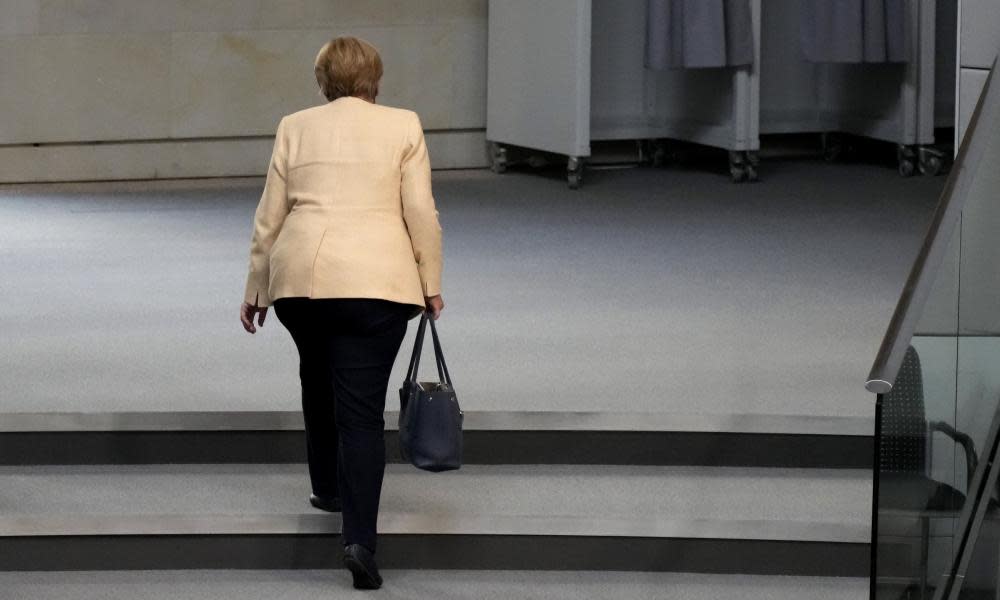Brexit made an unlikely hero of Angela Merkel for Britain’s remainers

Angela Merkel is used to being unimpressed by British prime ministers. She was appalled by David Cameron’s casual surrender of influence in Europe, all to placate fringe elements in his party. She was stunned, on first sitting down with Theresa May, to discover that there was no plan and no substance behind the “Brexit means Brexit” platitudes.
With Boris Johnson there was no danger of disappointment. His style and methods were known in advance to be everything Merkel is not. He is a bumptious improviser; she is a systematic problem-solver. She sifts evidence and builds consensus. He tells lies and divides to rule.
Johnson is also the last of five Downing Street occupants that Merkel will have dealt with over 16 years in office. A successor will be identified in elections on Sunday. When it comes to getting the measure of successive prime ministers, only Queen Elizabeth II beats the current German chancellor for depth of experience.
By the length of her reign, Merkel has acquired something like regal status not just in Germany but across Europe. She has been an anchor of continuity in an age of extraordinary volatility. She has helped navigate the EU through cascading crises, usually with tactical patches that defer hard strategic choices. The merits of that technique, and whether it can continue without Merkel’s personal authority, are disputed on the continent.
But in Britain Merkel represents something different, based on a more selective reading of the record. She is an icon for remain-voting liberals, who have experienced the past few years as something more traumatic than normal electoral defeat: more like exile.
That feeling derives in part from the fundamentalist dynamics of Brexit. The leavers denied it at first, but there was no way to accomplish their ambitions without banishing pro-Europeans and burning the things they held sacred. It was a domestic cultural revolution in which definitions of “Europe” were not always connected to international realities, or the actual EU. That was especially true of the paranoid hallucination of Brussels as a colonising oppressor. In reaction, many remainers fell into romantic embrace of the European project’s founding ideal – integration as insurance against war and the antidote to nationalism. That principled pro-European narrative informed Ted Heath’s determination to sign Britain up, but did not feature much in political debate thereafter.
Merkel makes a handy figurehead for that conception of Europe. She exudes rationality and pragmatism, which casts her as a natural opposite to demagoguery and populism. In 2015, she gambled on hospitality to Syrian refugees. In 2016, she greeted Donald Trump’s election victory with a barely coded rebuke, offering cooperation on the basis of shared values: “democracy, freedom and respect for the law and human dignity independent of origin, skin colour, religion, gender, sexual orientation or political views”. He repaid her with venom. She has been the world’s most powerful woman on a global stage groaning under the weight of swaggering men. She was the grownup in the room when Britain and the US looked like twins having a transatlantic tantrum.
Being German added a neat historical irony to Merkel’s standing as Europe’s anti-Trump. It looked like a parable of atonement and vigilance in the country that had salvaged democracy from the ashes of Nazism, rebuking complacency and incipient fascism in the self-styled bastion of the free world.
Things are never quite that simple. Merkel is a Christian conservative, not a humanist liberal. She is wary of multiculturalism, and pragmatic with authoritarians when intra-EU alliances or security of energy supplies require it. She has been patient to the point of indulgence with Viktor Orbán and Vladimir Putin. Such nuances of realpolitik are less of a concern for British remainers, who have too few heroes to be picky.
The problem – our problem, I should say, as a grieving Europhile – is that the Europe we miss is an expression of things we have lost in Britain, not a place to which we can return. The EU’s strategic interest now lies in making Brexit work according to the letter of the deal that has been done. It is a path of strategic divergence punctuated, for as long as Johnson is prime minister, by provocations that will sustain the myth of Brussels as the enemy of self-determination. Labour will corroborate that story with silence. The rest of Europe will work around its nuisance neighbour. That task involves a tricky balance between contradictory goals: cultivating healthy relations with a rich and powerful player in the region, while refusing concessions that might make Brexit look in any way like a plan that worked.
The rupture was painful, and the wound is open and raw for many British remainers. But the continental site of the injury is covered in scar tissue. That does not have to mean there is no reconciliation available, only that it feels remote right now. The unpredictability of recent years is a warning against confident long-term forecasts. Merkel was one of the few constants, which is why her exit feels so poignant; a sunset in the rear-view mirror.
For Germany, a new chancellor will bring new policies. For the EU it will be a test of cohesion. Those are measurable challenges. For remainers, the loss has a more abstract, nostalgic inflection. Merkel has been our ambassador from the time when there was no Brexit; when there was a place for Britain in a wider European project. That place is now kept open only in the remainer imagination, where Merkel stands on a pedestal, not for veneration as a leader, but as a monument to the leadership that pro-European Britain never had.
Rafael Behr is a Guardian columnist

 Yahoo News
Yahoo News 